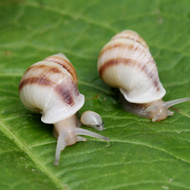
RZSS awarded conservation prize for work with the Partula snail
This month, the Royal Zoological Society of Scotland (RZSS) has sent five separate species of the Partula snail to be released into their native habitat of French Polynesia.
After near extinction due to the predation of the rosy wolf snail, species of the Partula snail, held in captivity, have grown in number as a result of the conservation efforts of RZSS Edinburgh Zoo and its partners.
The RZSS rescued the Partula snail from extinction and has been involved with the conservation of the species, since 1984. In 2010, the RZSS Edinburgh Zoo was given the last captive individual of the Partula taeniata simulans subspecies, which they have bred back up to safe numbers of several hundred. The zoo was awarded the ‘Biaza Award for Significant Contribution of Conservation Breeding’ in 2012 for saving the Partula species.
Gareth Bennett, senior presenter at RZSS Edinburgh Zoo, said: “It is extremely exciting to be able to send some of our Partula snails, which we have been breeding for years, to be reintroduced directly back into their native habitat.
“This is a wonderful conservation success story and further demonstrates the critical role zoos can play in species conservation. We hope that the Partula reintroduction will provide a model framework for other species reintroduction programmes worldwide.”
The RZSS Edinburgh Zoo has planned further reintroductions of more species, later this year and next. The critically endangered Partula affinis will return to its native Tahiti, whilst Partula mooreana, Partula suturalis vexillum, Partula tohiveana and Partula taeniata simulans (which are all extinct in the wild) will be returning to the island of Mooreana.
Image © RZSS



 RCVS Knowledge has welcomed Professor Peter Cockcroft as editor-in-chief for Veterinary Evidence.
RCVS Knowledge has welcomed Professor Peter Cockcroft as editor-in-chief for Veterinary Evidence.